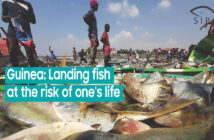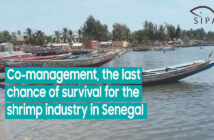Fish are becoming increasingly scarce in Lake Tanganyika. This situation has a noticeable impact on the diet of Burundians. According to the country’s Direction of Fisheries Management, between the years 2000 and 2012, fish catch numbers have decreased from 20,000 tons per year to 10,000 tons per year.
In Bubanza, Western Burundi, a town located 27 km from Bujumbura, a group of about 50 young people, mostly students or unemployed graduates saw an opportunity to do good business by going into fish farming. In May 2014, they created the Fish Production and Marketing Cooperative (COPIMUCOPO).
The cooperative started with four ponds and was able to increase the number to 50. “In the first six months, we produced three tons per hectare but we are now producing around five tons per hectare,” says Cyriaque Ndayiragije, who is the spokesperson for COPIMUCOPO.
Physical strength, an important ally
“In the beginnings, we relied our physical strength. We used hoes and pearls to dig the ponds. The dimensions of the ponds varied from 20m by 40m for some to 40m by 50m for others,” explains Ndayiragije. They seeded each pond with about 2,400 fish fry and subsequently fertilized the water to have some phytoplankton. It should be noted that these young people were trained in fish farming in Uganda and take advantage of the expertise of Déo Karega, a Burundian fish farmer trained in Egypt.
The group mainly breeds tilapia fish. “At first, we were breeding mixed fish but we noticed that is was not very profitable so we decided to have fish of only one sex (male) in the ponds,” says Ndayiragije. The fish farmers use semi-artificial reproduction as a way to have small fish that they can sell to other farmers.
These young fish farmers stand out by putting good quality fish at a competitive price on the market. They sell the fish at 5100 Burundian francs per kilogram, which is about 3 USD. The price is thrice higher in the fish shops in town. Despite of all the difficulties, COPIMUCOPO has a monthly turnover of more than 3 million Burundian francs, around 1800 USD.
A brighter future
 “Despite a university degree, I was unemployed. Presently, thanks to the cooperative, I was able to re-enroll in a private university and I have bought my own plot,” affirms Cyriaque Ndayiragije. He has no doubt that the future will be brighter.
“Despite a university degree, I was unemployed. Presently, thanks to the cooperative, I was able to re-enroll in a private university and I have bought my own plot,” affirms Cyriaque Ndayiragije. He has no doubt that the future will be brighter.
Célestin Ndikumana, another member of the cooperative, added: “thanks to our project, we no longer count on the government to get a job”. He also pointed out that they have now become employers: “We hired seven people: three watchmen, two cleaners and two additional people to monitor water quality. They receive an average of 36 USD a month (61,200 Burundian Francs)”. In Burundi, the average salary is 100,000 Burundian Francs (58 USD). The cooperative has a total of 50 members.
After every harvest, a share of the proceeds is saved in a bank account while the other is shared equally between the members. What is next? The young fish farmers plan to open their first fish shop where they will sell their productions. “We will open it in front of a large market to allow our customers to be supplied without having to travel too far,” says Ndayiragije.
Fish farming was introduced in Burundi in the 1950s by the colonizers and has experienced little development until now due to a lack of interest and support. Nowadays, there are some incentives from the government in support to this activity. For example, a large number of fish farms have been created in various localities of the country such as Karusi and Gitega (in central Burundi), Kirundo (in the north), and in the outskirts of Bujumbura and Bubanza (Western Burundi).

|




